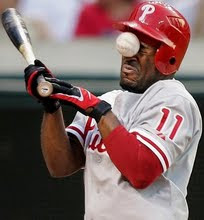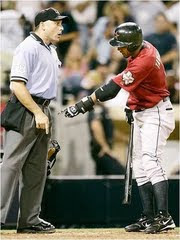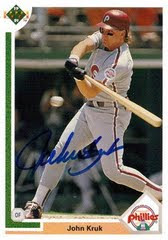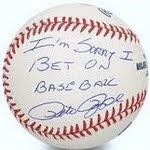*sorry to anyone who was patiently waiting but my final analysis is done*
I was doing a podcast with my buddy Keith (which BTW you can hear via the links on the side or type in "gameofinches" into iTunes and subscribe to our podcast) and I asked him if Jay Cutler would put up similar numbers with Chicago as he did in Denver and he said yes. I then asked him if he thinks Devin Hester, the Bears #1 receiver, will get over 1000 yards. He said no. This seemed counter intuitive to me. How can a QB be so dominant without at least one receiver be equally as dominant? (Granted I did ask Keith only about one specific receiver but I'm pretty sure if I asked him "will any Bears receivers get at least 1000 yards, I'm sure his answer would not have changed). So I decided to do some analysis to see how many yards QBs can throw without having a 1000 yards receiver? Here's what I found out
Here's a list of the year, the quarterback, how many yards he threw, and how many 1000 yards receiver he had/ the receiver with the most yards on his team
2008:
1) Drew Brees (5,069)- Lance Moore (928)
2) Kurt Warner (4,583)- Larry Fitzgerald, Anquan Boldin, and Steve Breaston
3) Jay Cutler (4,526)- Brandon Marshall
4) Aaron Rodgers (4,038)- Greg Jennings, Donald Driver
5) Philip Rivers (4,009)- Vincent Jackson
6) Peyton Manning (4,002)- Reggie Wayne
7) Donovan McNabb (3,916)- DeSean Jackson (912)
8) Matt Cassel (3,693)- Wes Welker, Randy Moss
9) Chad Pennington (3,653)- Ted Ginn Jr (790)
10) David Garrard (3,620)- Matt Jones (761)
2007:
1) Tom Brady (4,806)- Randy Moss, Wes Welker
2) Drew Brees (4,423)- Marques Colston
3) Tony Romo (4,211)- T.O., Jason Witten,
4) Brett Favre (4,155)- Donald Driver
5) Carson Palmer (4,131)- Chad Johnson (Ochocinco), T.J. Houshmandzadeh
6) Jon Kitna (4,068)- Sean McDonald (943)
7) Payton Manning (4,040)- Reggie Wayne
8) Matt Hasselbeck (3,966)- Bobby Engram
9) Derek Anderson (3,787)- Braylon Edwards, Kellen Winslow
10) Jay Cutler (3,497)- Brandon Marshall
2006:
1) Drew Brees (4,418)- Marques Colston
2) Peyton Manning (4,397)- Reggie Wayne, Marvin Harrison
3) Mark Bulger (4,301)- Torry Holt, Issac Bruce
4) Jon Kitna (4,208)- Roy Williams, Mike Furrey
5) Carson Palmer (4,305)- Chad Johnson (Ochocinco), T.J. Houshmandzadeh
6) Brett Favre (3,885)- Donald Driver
7) Tom Brady (3,529)- Reche Caldwell (760)
8) Ben Roethlisberger (3,513)- Hines Ward (975)
9) Philip Rivers (3,388)- Antonio Gates (924)
10) Chad Pennington (3,352)- Lav Coles
11) Eli Manning (3,244)- Plaxico Burress (988)*
12) Rex Grossman (3,193)- Muhsin Muhammad (863)
2005:
1) Tom Brady (4,110)- Deion Branch (998)*
2) Trent Green (4,014)- Eddie Kennison
3) Brett Favre (3,881)- Donald Driver
4) Carson Palmer (3,886)- Chad Johnson (Ochocinco)
5) Eli Manning (3,762)- Plaxico Burress
6) Kerry Collins (3,759)- Randy Moss
7) Peyton Manning (3,747)- Marvin Harrison, Reggie Wayne
8) Drew Bledsoe (3,639)- Terry Glenn
9) Drew Brees (3,576)- Antonio Gates
10) Matt Hasselbeck (3,459)- Bobby Engram (778)
2004:
1) Daunte Culpepper (4,717)- Nate Burleson
2) Trent Green (4,591)- Tony Gonzalez, Eddie Kennison
3) Peyton Manning (4,557)- Reggie Wayne, Marvin Harrison, Brandon Stokley
4) Jake Plummer (4,089)- Rod Smith, Ashlie Lelie
5) Brett Favre (4,088)- Javon Walker, Donald Driver
6) Mark Bulger (3,964)- Torry Holt, Issac Bruce
7) Jake Delhomme (3,886)- Muhsin Muhammad
8) Donovan McNabb (3,875)- T.O.
9) Aaron Brooks (3,810)- Joe Horn
10) Tom Brady (3,692)- David Givens (874)
* denotes top wide receiver that year to not get minimum 1,000 yards receiving
Assumptions:
1) Sample Size. I am assuming 50 instances will be enough to determine actual and "correct" conclusions. If I was doing a more scientific study, maybe I would go back a few more years, but having too much data is a hindrance as well. I am still confident that we can draw accurate conclusions though the data I have gathered.
2) Health. I am also assuming that QBs had the same wide receiver for all 16 games in a way. When trying to decide a corollary between at least one receiver and a QB, it would help if they played all the games, right? Well the thing is, if a QB has done extremely well and put up big yards over the course of 14-16 games, I don't really care how healthy his receivers are, because I'm looking at a final product (the QBs numbers) and see if a single instance (a 1000 yard receiver) is the cause. So if a receiver missed a game or two, I don't believe it has an impact on final numbers. (Plus, I know from watching games an paying attention to the NFL in recent years that some 1000 yard receivers on this list have missed multiple games, some have been healthy all 16 games, some non-1000 yard receiver have missed multiple games and some have been healthy which leads me to believe that health really is a non-factor)
Trends:
1) 80% of all QBs [in the top ten in passing yards] had at least one wide out with at least 1000 yards receiving
2) No quarterback who finished top 6 had a receiver catch for under 900 yards and only once (2005, Tom Brady) did a QB who finished top 8 and had a receiver catch for under 900 yards
3) Twice (2008, 2006) has the top QB had a receiver not catch for at least 1000 yards (although in 2006 Deion Branch was short by only two yards), and the top passing QB on this list (2008 Drew Brees) did not have a 1000 yard receiver nor was he really all that close
4) Only two QBs had at least three receivers get 1000+ yards and both times, that QB was #2 in passing yards
5) All but three QBs had their best receiver get at least 800 receiving yards
6) No QB who finished in the top ten in passing yards have had their best receiver go under 760 yards
7) No year had all top ten QBs have at least one of their receivers get 1000+ yards
8) All QBs who threw between 3,693 and 5,068 yards in a season (with the exception of Tom Brady in 2005 who had a receiver that was two yards short and 2007 Jon Kitna) had a 1,000 yard receiver.
Final Conclusion:
Well now it's time to re-evaluate our final question: can Jay Cutler be as dominant as he was in the past without having a single Bears receiver get at least 1000 receiving yards? Yes. But when you look at the last trend, you see that it's extremely hard to be truly good, not comparatively good, but good on your own, without a 1,000 yard receiver.
I was proven wrong at my first line of analysis when Drew Brees threw for 5000+ yards and didn't really have a close 1000 yard receiver. Brees had a phenomenal season and was awesome yet didn't have a 1000 yard receiver. He obviously had to throw it to multiple receivers but to not have ONE receiver catch about 20% of your passes (yardage wise) when you throw it that often seems absurd. But for the most part, if a QB is truly dominant, he will have a 1,000 yard receiver.
I think it's extremely important to note that if the question was changed to 900+ receiving yards instead of 1000, the circumstances would change. To be even the best QB in a particular year, you would probably need at least one receiver get a minimum of 900 yards. And, this seems easier to do than to be truly dominant on your own. And let's be honest, if Jay Cutler was even comparatively good, Chicago fans would probably call for his Hall of Fame vote.
It seems extremely hard to be the best of the best without a 900 yard receiver. The one time it was ever really done (a top 8 QB) was by Tom Brady (and you'd be hard pressed to find anyone, even people in Denver and Chicago to say Cutler is better than Brady, or even on par with him). So if Jay Cutler is to be an elite QB next year, I think one receiver on the Bears needs to get at least 900 receiving yards. And if he truly is awesome, I think one Bears receiver will get 1,000+ yards.
Now obviously as this data has proven, it is not without the realm of possibility to be an elite QB without really an elite receiver. On an individual basis, it certainly can happen where Cutler ends up being a Pro-Bowl worthy and the receiving corps still looks mediocre. You can point to many examples, not only within the past five years, but throughout the NFL history where this can occur. Last year alone was a great example of that.
However, I don't necessarily see that happening. The main reason I think this is is because of Cutler's receivers. In two years, Devin Hester has had 299 and 665 receiving yards, respectively. Rashied Davis has never gotten over 445 receiving yards (per year) in his career. The other Bears QB are ether going to be rookies or guys like Earl Bennett who haven't really gotten any playing time. Now, for me to say Cutler won't be top six next year because I don't think any of his receivers will be any good is just my own opinion as a Bears fan. It is certainly possible for Cutler to be just a good QB that makes his receiving corps better and thus at least one of his receivers will get 900+ yards, and if Cutler is an elite and a (deserving) Pro-Bowler, I think you will see at least one Bears receiver put up numbers not many people would expect.
So overall, will Jay Cutler, next year, (without getting Plaxico Buress, Brandon Marshall, or really any other proven wide out) put up numbers like he did in Denver? I absolutely don't think so. But will he be what I have called "comparatively good" and he a top 10 QB next year? I do think so. And will any Bears receiver get over 900 yards? My guess is no, but I don't think it's improbable at all.
How Many Yards Can Jay Cutler Get?: A Study Into QB Passing Yards and a #1 Receiver's Yards
Posted by
Adam Kaplan
on Saturday, July 11, 2009
Labels:
Jay Cutler,
Passer/ Receiver Correlation







3 comments:
oh my god i cannot read that much. I actually listened to the 3 new podcasts on friday, the one day the internet worked down there
I know, I'm sorry, but read everything after "Final Conclusion" and you'll get the gist of this post.
Also read "trends". Sure that's a long post but still not as long as the original post
Post a Comment